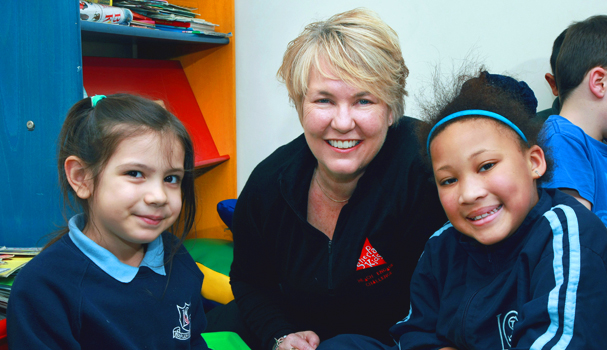- 0203 823 7060
- info@sherpakids.co.uk
International childcare franchise Sherpa Kids is scaling new heights
Going from a New Zealand-based venture with just 19 sites to a global childcare franchise with a presence in five continents, Sherpa Kids has found a way to balance rapid expansion with a personalised touch.
 Taking care of people’s children requires a personal approach and, for this reason, it may seem incompatible with a truly consistent global brand. But Sherpa Kids, the international childcare franchise, has created a model that enables franchisees across countries as far afield as Canada, South Africa and Australia to tailor their offering to individual children’s needs. And it has been able to achieve this with a little bit of tech and a whole lot of franchising experience.
Taking care of people’s children requires a personal approach and, for this reason, it may seem incompatible with a truly consistent global brand. But Sherpa Kids, the international childcare franchise, has created a model that enables franchisees across countries as far afield as Canada, South Africa and Australia to tailor their offering to individual children’s needs. And it has been able to achieve this with a little bit of tech and a whole lot of franchising experience.
Vicki Prout, managing director of Sherpa Kids Australia and co-director of Sherpa Kids International, is certainly no stranger to international franchising. After 12 years serving in the Royal Australian Navy, she bought a pet food business and quickly helped it to triple in size. Once she had sold the business, she went to a franchise show to scout out opportunities and bought a promotional products franchise, of which she became state master. “Due to my success there, they asked me to come over to England and launch the pilot, which I did
in 1998,” she says. “We then sold 80 franchises off the back of that.”
By this time Prout was looking to return to Australia. During the five years she spent growing her franchise in the UK, she’d met the directors of Cartridge World. As the ink and toner franchise was based in her native Adelaide, she decided to approach them for a job – and they took her on. “They had 436 stores,” Prout says. “By the time I left they had 1,604 in 40 countries.”
Understandably, after such an intensive period, Prout was drained and looked to change gears. She headed to New Zealand and set up Sherpa Group, a consultancy firm. “I was working with a lot of businesses to help them franchise or license or grow,” she says. It was whilst attending a franchise show that she first came across Safe Kids In Daily Supervision (sKids), the franchise that would one day become Sherpa Kids. “They were looking to come across to Australia so they engaged my consulting company Sherpa Group to do a market entry plan,” she says.
This was when she first met Dawn Engelbrecht, CEO of sKids New Zealand and co-director of Sherpa Kids International. Engelbrecht wasn’t a founder member of sKids; her involvement with the childcare franchise actually began as a franchisee. But eventually she and her business partner bought out the original franchise owner and became the franchisors for New Zealand in 2006. After they met Prout through her consultancy work, she seemed like the perfect addition to drive the brand’s international growth. “They liked me, I liked them,” Prout says. “So Dawn and I joined forces and we went international together as 50/50 owners.”
One of the first things the team decided to review was the franchise’s brand; whilst sKids had proven popular in the New Zealand market, the team decided it wasn’t the best name for international expansion. “My consulting firm was getting really good reviews and raves and comments about its name,” says Prout. “Sherpa is Tenzing Norgay; when you look at him he’s confident, he’s an expert, he’s a guide.” This made it a great analogy for a childcare franchise, particularly one so set on global expansion. And it has certainly lived up to the fearless reputation credited to its namesake. Since beginning expansion in 2011, Sherpa Kids has already grown rapidly. Not only has it added Australia but it sold the master rights to England in 2012, Ireland and South Africa in 2013, Canada in 2014 and the Middle East in the early part of this year. “It’s a bit quick,” laughs Prout. “But we’re experienced; I’ve been franchising for 18 years so that helps.”

Prout credits its ability to expand to more than just the pair’s experience in international franchising though; first of all, demand plays a significant part. As we increasingly work longer hours and schools become more stretched there’s a real need for childcare brands to take up some of the strain. “Parents are all working much longer and nearly every day in the paper you see that there are stress points in schools,” says Prout. “Teachers have got their full-time job to do, never mind worrying about, ‘what are the children going to do between three and six?’” This has meant there is a huge demand around the world for franchises like Sherpa Kids.
But there’s a little more to it than time-poor parents and schools. While many franchises focus purely on replicability, localisation is a key thread of Sherpa Kids’ offering and is helping it to expand to new locations with ease. Regulations can vary massively from country to country; OFSTED standards are entirely different to equivalents in Australia or South Africa. “We decided to use the country master mythology to franchise because of that localisation and regionalisation of the documents,” says Prout. “We needed someone to come in and own them in each country.”
However, even outside the localisation usually afforded by master franchising, Sherpa Kids franchisees are much freer to tailor their offering to the requirements of the local area. “Franchisees have so much flexibility to change the structures that we use,” Prout says. “It’s all down to what that school’s or individual child’s needs are. It’s done locally.” This makes it something of a curiosity in franchising terms as the model can be adapted far more than one would usually expect for an international franchise. “We’ve got access to global lessons and themes but it’s really then supported by a local owner,” she explains.
Whilst managing this across an international franchise empire might sound like more than a slight headache, Sherpa Kids has a secret weapon up its sleeve. “We have an online platform instead of having traditional operations manuals in hard copy that we can’t change,” says Prout. “Our changes can be immediate.” This means that the franchise can understand what is happening across the entire brand, as well as roll out new best practice or react to legislative changes across the network. “It allows us as the franchisors to know what’s going on there so we can advise and add value,” she explains.
Its ability to tailor its service exactly to the requirements of local parents and schools has proven a hit during its exploration of our fair shores. The franchise is currently working in six schools in London; as its presence grows it has found demand begin to soar. “We’re starting to get the groundswell from parents saying, ‘I want to enrol in this school but you haven’t got after school clubs,’” Prout says. “And, as I’ve said, it’s hard for schools to offer them.” This means Sherpa Kids has found the enquiries are now coming in thick and fast.
However, despite this, the franchise isn’t letting itself be drawn into growth that is unsustainable. “We won’t let the tail wag the dog,” says Prout. Rather than splurging money on advertising and finding itself unable to keep up with demand, it carefully identifies areas that can best support a Sherpa Kids franchise. “The business model means that around 3,500 enrolled students is one franchise,” she says. “That might be ten, 12 or 14 schools in one area.”
Even factoring in the significant international growth it has seen in the last five years, Sherpa Kids isn’t rushing its expansion plans. “We’re getting enquiries around the world every day but we plant them,” says Prout. The franchise is striking a balance of controlled yet significant growth that will consolidate its position on the international stage, priming new markets as they become ready and organically growing the national franchise base from there. And when the time is right – what then? “Global domination,” Prout laughs.
Written by Josh Russell on Monday, 13th April 2015.

